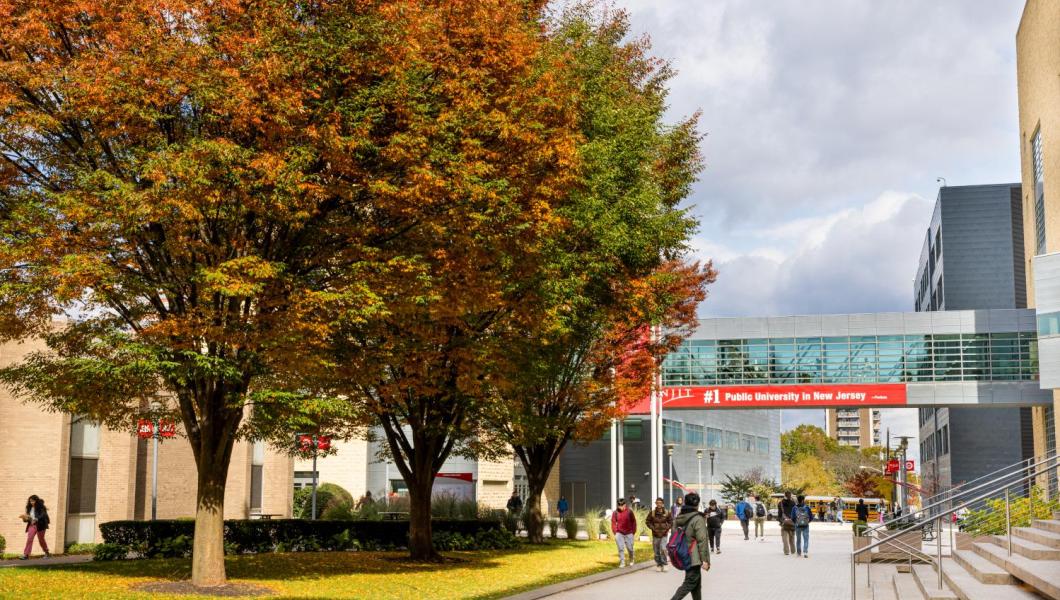Leir Research Institute Conference Centers on Well-being, Connectedness and Resilience

Esteemed guests joined NJIT faculty, students and staff April 15 for the inaugural research conference of The Henry J. and Erna D. Leir Research Institute for Business, Technology, and Society. The Martin Tuchman School of Management-sponsored event was themed “Well-being, Connectedness and Resilience,” and gathered internationally recognized university researchers, industry experts and foundation representatives — from Princeton, Cornell, Rutgers, IBM and the Robert Wood Johnson Foundation, to name a few — to talk about the latest coordinated and innovative approaches to transform health care, develop autonomous systems and manage disruptions.
“We advance technologies to develop autonomous systems to better connect and support communities. The overarching goal is to achieve the well-being of the society by improving people’s health and quality of life,” said Yi Chen, MTSM professor, the Henry J. Leir Chair in Healthcare and director of the Leir Research Institute, who organized the conference with Reggie Caudill, MTSM dean, and Jim (Junmin) Shi, associate professor of supply chain management and finance. “The institute provides a platform to connect experts in diverse domains across various sectors through the conference and beyond toward this goal.”
Two keynote speakers addressed the crowd: Robert Cohen ’83, ’84, ’87, vice president and chief technology officer for global research and development in the Joint Replacement Division of Stryker, and vice chair of NJIT’s board of trustees; and Wendy Nilsen, lead program director of the National Science Foundation’s (NSF) Smart and Connected Health Program.
Cohen, who has 35 years of experience in the orthopedic medical device industry and has managed research, development, manufacturing, regulatory, clinical research, quality and marketing functions, noted “there has never been a convergence of technology like today.” During his presentation, “Challenges, Technologies, and Impacts of Innovative Orthopedic Surgical Procedures and Implanted Device Prostheses,” he homed in on robotics, 3D printing and predictive analytics, and how Stryker employs new technologies to design and manufacture implants, and generates data that can help hospitals drive operating-room and surgical efficiency.
“With 3D printing, we can make implants differently, and with data and robotics, we can get more information on a patient and execute a [surgical] plan like never before,” he commented.

Nilsen, in her NSF role, focuses on the intersection of technology and health, which includes data collection, advanced analytics and effective cyber-human systems. She is also co-chair of the Health Information Technology Research and Development working group of the Networking and Information Technology Research and Development Program. For her presentation, “Building Smarter, Better Connected and More Resilient Healthy Communities,” she zeroed in on the need to share data, promote scalability and foster collaboration, rather than operate in scientific silos.
“We don’t work together the way we should,” Nilsen told the audience. “We need to build communities of practice.”
The conference also featured remarks from Provost and Senior Executive Vice President Fadi Deek and Senior Vice Provost for Research Atam Dhawan; technical sessions concerning autonomous systems and connectedness, health care and well-being, and risk management and resilience; and a panel discussion that explored the event’s theme in greater detail.
Wrapping up the day was a reception and poster session spotlighting projects of NJIT faculty and Ph.D. students. Based on voting by the conference participants, Jinhe Shi, fourth-year Ph.D., was awarded Best Poster for his presentation, “Accurate Patient Health Condition Extraction from Unstructured Data.” Runner-up was Abubakar-sadiq Abdulai, second-year Ph.D., for “Physician Referral Patterns Following the Passage of the Affordable Care Act.”


